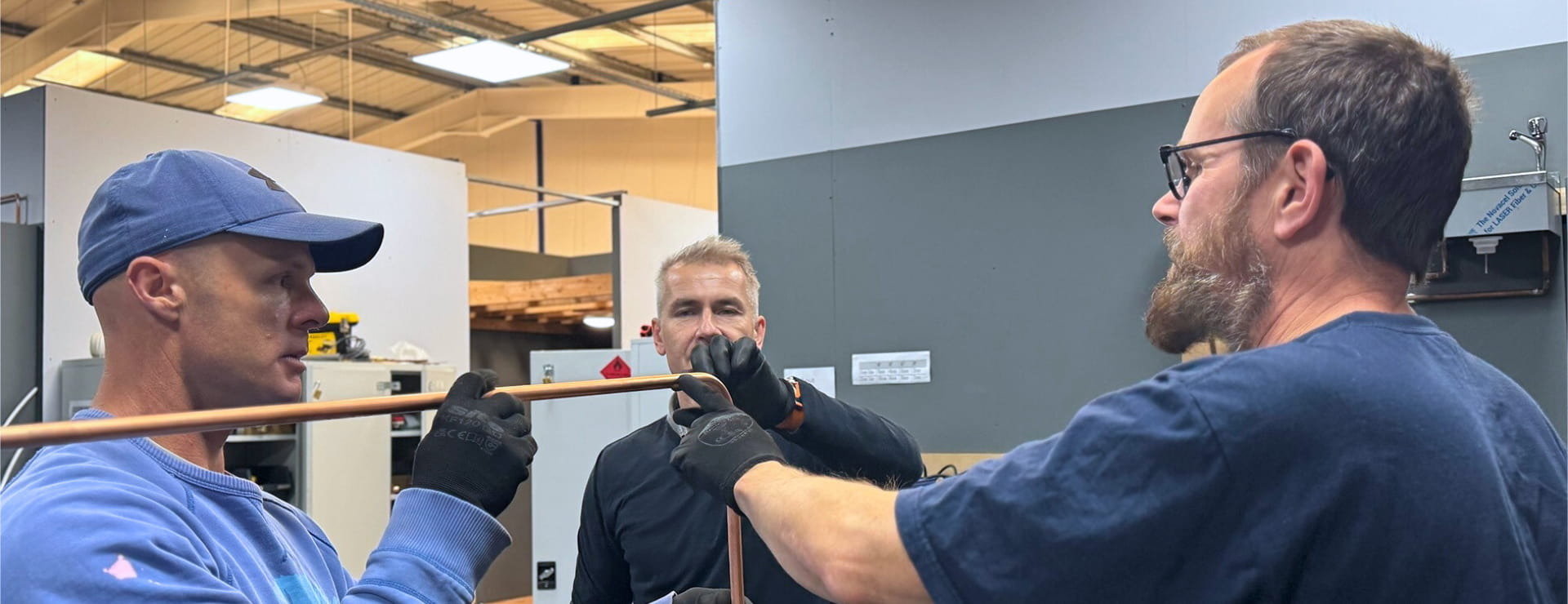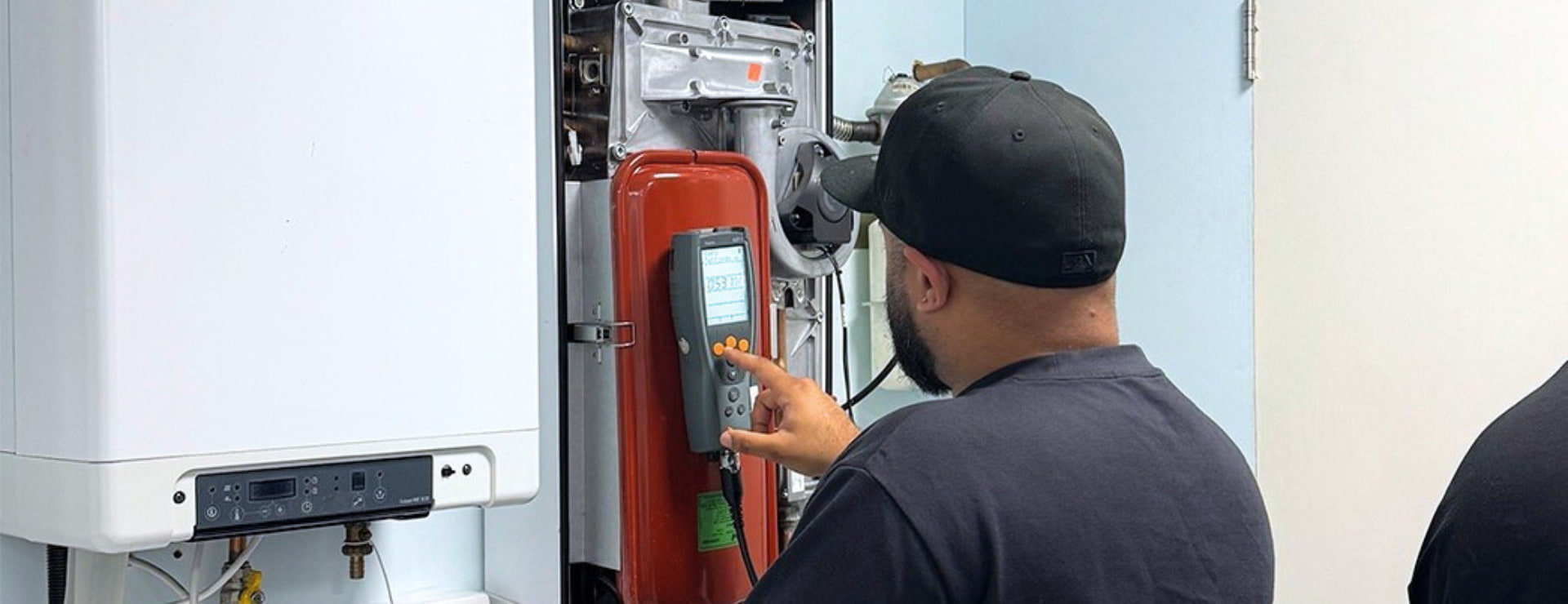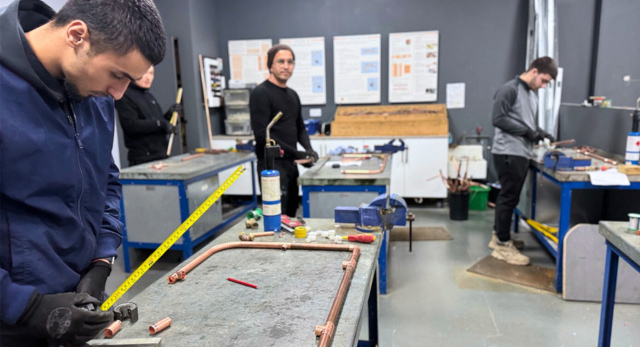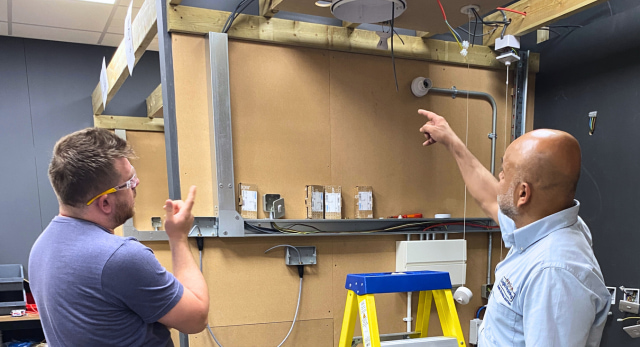Thinking about retraining as a gas engineer in 2026? This article covers why the trade is in high demand, what qualifications and routes are available, how long retraining takes, the costs involved, and career prospects. Whether you’re starting from scratch or changing careers, discover how to qualify for Gas Safe registration and unlock secure, well-paid opportunities in the UK’s gas industry.

Why Retrain as a Gas Engineer in 2026?
Retraining as a gas engineer in 2026 offers a promising career path with numerous benefits. This profession is growing rapidly due to the ongoing demand for skilled professionals who can safely install, maintain, and repair gas appliances. Whether you are looking for job security, better pay, or a rewarding hands-on role, becoming a gas engineer is a solid choice that opens doors to various opportunities.
Retraining as a gas engineer can lead to a career that provides:
- High demand due to skills shortages and ongoing domestic gas appliance needs.
- Strong earning potential with salaries typically between £30,000 and £40,000+ per year.
- Diverse career paths, including domestic, commercial, and renewable gas technologies.
- Opportunities to be self-employed or work with major companies.
- Job satisfaction from working hands-on and helping keep homes safe and warm.
The Main Training Routes to Becoming a Gas Engineer
If you want to retrain as a gas engineer in 2026, there are several clear routes available, each designed for different starting points and learning preferences. At Logic4training, the focus is on quality, real-world experience, and accredited qualifications that will set you up for a long-term, successful career in the gas industry. Here’s a breakdown of the main training options:
1. Gas managed learning programme (MLP)
This is the most popular route for career changers and new entrants without industry experience. The MLP combines theoretical knowledge with hands-on practical training, including time spent on-site under the supervision of experienced gas engineers. You’ll build a portfolio of real jobs, which is required by the Accredited Certification Scheme (ACS). Once your portfolio is complete, you will undertake the ACS assessment, covering safety and appliance modules, which will then lead to Gas Safe registration. The course is designed for faster entry, with options to fit full-time study or more flexible schedules.
It is important to note that most training providers will offer at least two levels of Gas MLPs. Generally, there will be options for:
- New Entrants Route: Designed for those with little to no experience. New Entrant Routes will take a bit longer to complete as they will include additional plumbing elements to bring learners up to a standard level before learning about gas.
- Experienced Trades Route: For those with relevant trade experience, such as plumbing or having experience as a kitchen fitter. These tailored programmes take account of your existing skills, shortening the overall duration of training and focusing directly on gas-specific competencies.
Key qualifications
- LCL Awards Managed Learning Programme
- ACS – Core Domestic Natural Gas Safety and Appliances (CCN1 and Appliance codes, for example, CENWAT or CKR1 etc)
- Depending on the training provider’s Gas MLP training options, learners will be able to add in additional qualifications such as:
The CCN1 core domestic gas safety certificate is considered equivalent to a Level 3 QCF/RQF qualification within the gas utilisation sector. It is aligned with the Accredited Certification Scheme (ACS) and fulfils the same gas safety standards, resulting in a recognised certificate of competence accepted by the Gas Safe Register.
Why choose this route?
This route is ideal for career changers and those without previous experience in the gas industry. It provides a structured training route that blends classroom theory with hands-on practical training, as well as essential site-based work. The course offers the flexibility to be completed in around 7 months full-time or over a longer period for those studying part-time (depending on the training provider). Ultimately, it serves as a crucial stepping stone towards Gas Safe registration, allowing successful candidates to become legally employable as gas engineers throughout the UK.
2. Gas engineering apprenticeship
A gas engineering apprenticeship offers a paid, work-based path into the industry, making it a popular choice for both school leavers and adults looking to earn as they learn. Apprentices work alongside experienced professionals, gaining real-world site experience and developing practical skills while studying towards their qualifications. Training is split between on-the-job learning and classroom-based study, often delivered as day release or in block sessions by an approved provider. Over the duration of the apprenticeship, learners build a portfolio of work-based evidence and develop the competence required to progress to assessment. In addition to substantial workplace training, the apprenticeship includes the mandatory Accredited Certification Scheme (ACS) assessment. Once the programme and assessment are complete, candidates can apply for Gas Safe registration, making them legally qualified to work as a gas engineer anywhere in the UK.
Key qualifications
- Level 3 Diploma in Gas Engineering (NVQ or equivalent), available through registered apprenticeship frameworks.
- ACS – Core Domestic Natural Gas Safety and Appliance modules (CCN1 and relevant appliances, such as CENWAT or CKR1).
- Work-based portfolio demonstrating competence across domestic gas installations, maintenance, and safety.
- Some apprenticeships may also include additional industry-recognised certificates and functional skills training.
Why choose this route?
A gas engineering apprenticeship is ideal for those who want to combine paid work with structured training and gain extensive hands-on experience from day one. It is open to learners of all ages, provides valuable, real-world skills, and is highly regarded by employers. This route offers a comprehensive, employer-led training experience, building confidence and capability in all aspects of gas work. Taking around 18 months to complete, an apprenticeship leads directly to ACS assessment and Gas Safe registration, laying the foundations for a long-term, successful career as a gas engineer.
5 year reassessment: What you need to know
Becoming a qualified gas engineer is just the start of your professional journey. Ongoing safety and competence are crucial to maintaining your ability to work in the industry. In the UK, all Gas Safe registered engineers must renew their core ACS certification every five years. This reassessment ensures that your knowledge of gas safety regulations, industry best practices, and appliance standards remains up-to-date.
During the reassessment process, you will need to complete refresher training and successfully pass updated ACS modules relevant to your scope of work, such as CCN1 (Core Domestic Gas Safety) and any specific appliance codes (for example, CENWAT for central heating or CKR1 for cookers). This regular reassessment not only satisfies regulatory requirements but also demonstrates to employers and clients that you remain compliant and competent in a fast-evolving industry.
To help engineers keep their qualifications live, Logic4training offers a range of ACS renewal and reassessment courses designed to support you through every stage of this process, helping you stay certified, confident, and legally employable throughout your career.
A note on online and blended courses
Please be aware that some training providers offer online practical training. Whilst this sounds like a good idea, it can come with some hidden risks that prospective learners should be aware of, such as poor quality of content, limited contact time and misleading terms and conditions. We have gone into more depth on the topic of online training in the trades and its risks, which you can read here. For anyone who is considering learning a trade, please take the time to read this article.
How Long Does It Take to Retrain as a Gas Engineer?
The duration to become a qualified gas engineer varies depending on the training route and individual circumstances. Below is a breakdown of typical pathways and who they’re designed for:
| Route | Typical Duration | Who’s it for? |
|---|---|---|
| New Entrant Gas Managed Learning Programme | 8-12 months | Career changers and those with no previous industry experience. |
| Experienced Trades Gas Managed Learning Programme | 6-8 months | Those with relevant trade experience. |
| Gas Engineering Apprenticeship | 1-2 years or longer | School leavers and adults wishing to earn as they learn. |
Training durations will vary from person to person due to the portfolio element. This is because the portfolio requires learners to document their jobs, and so it is only natural that people source and complete jobs at different speeds. Training providers can help with sourcing the required jobs if needed.
It’s also important to note that the industry regulators have set a mandatory 6-month minimum period for learners to complete their portfolio.
For more guidance and a deep dive into training timescales, read Logic4training’s article on how long it takes to become a gas engineer.
How Much Does It Cost to Retrain as a Gas Engineer?
The cost of retraining as a gas engineer will vary depending on the training route that you take and the training provider’s cost. Below we have given an overview:
- New Entrant Gas Managed Learning Programmes: Typically range between £4,000 to £7,500. It is important to check what is included in the costs, as there is a large variance between training providers in what elements they include.
- Experienced Trades Gas Managed Learning Programmes: Typically range between £3,000 to £5,500. It is also important to check what is included in the costs, as there is a large variance between training providers in what elements they include.
- Apprenticeships: Often funded or subsidised; earn while you train.
- ACS reassessment: Range from £550 to £1,050
Please note that these prices are as of December 2025 and may change. Additionally, some companies don’t display their prices on their websites, so their prices could be lower or more expensive.
At Logic4training, we offer flexible payment plans and finance options to help spread the cost of the training course. Check out our gas course prices and packages for the latest deals.
Retrain as a Gas Engineer at 40 (or 50, or beyond)
Choosing to retrain as a gas engineer later in life is more common than ever, and it comes with its own unique benefits. Many people make the switch in their 40s, 50s, or even beyond, bringing experience and maturity that help set them apart in the trade.
There is no upper age limit for gas engineer training, which means mature trainees, often admired for their reliability and strong people skills, are warmly welcomed into the industry. Career changers from trades like plumbing or electrics will find that many skills are transferable, helping to streamline the retraining process. With the demand for experienced, trustworthy gas engineers on the rise, mature entrants are not just accepted. They’re highly sought after.
Whatever your previous profession, retraining offers a realistic and rewarding pathway to a stable, skilled trade. Age is an asset, not a barrier, in today’s gas industry, and those who retrain later in life often discover new confidence, job satisfaction, and excellent prospects for the future. Retraining as a gas engineer later in life is increasingly popular and offers real advantages. Many individuals are making successful career changes in their forties and fifties, proving it’s never too late to enter the gas industry.
If you’re thinking of retraining at 40 or beyond, take confidence in knowing your life experience and practical skills are valued, not as a barrier but as a real benefit in today’s gas engineering workforce. The right training can open the door to a rewarding, future-proof career, regardless of your starting point in life.
We’ve helped many people switch their careers, and you can hear from them here:

What Qualifications Do You Need to Become a Gas Engineer?
To work as a domestic gas engineer in the UK, you need to complete industry-recognised training, like we have previously covered, and then sign up to the Gas Safe Registered. Whilst it isn’t a qualification, the Gas Safe Register is the only official gas registration body in the UK and therefore engineers must register with it to legally carry out gas work in the UK.
To become Gas Safe registered, learners must hold a valid ACS core gas safety CCN1 qualification. However, to work on gas appliances, engineers will need to hold the relevant qualification, such as boilers (CENWAT) or cookers (CKR1) etc.
For those looking to advance further, obtain specialist skills, or pursue work in commercial settings, you can continue by adding qualifications such as LPG, commercial gas, or renewables, as well as certificates for hot water systems and energy efficiency. These additional qualifications expand your expertise and increase your employability across the wider heating and energy sector.
See our detailed guide to the qualifications you need to become a gas engineer which goes into the topic in more depth.
What’s the Job Like? A Day in the Life of a Gas Engineer
Gas work is varied, practical, and never dull. Here’s what you might get up to:
- Installing, servicing, and repairing gas boilers, gas appliances, and heating systems and their associated pipes.
- Diagnosing issues and ensuring gas safety compliance.
- Working in domestic and commercial, depending on qualifications.
- Advising clients on energy efficiency and new heating technologies.
- Balancing technical skills with customer service and safety awareness.
You’ll need practical problem-solving abilities, solid numeracy skills, and the confidence to work safely under pressure. Fortunately, Logic4training’s courses are designed to equip you with all the technical knowledge and soft skills required, so you’ll graduate fully prepared for every challenge a modern gas engineer faces.
The Logic4training Advantage: Why Train With Us?
When it comes to training as a gas engineer, Logic4training stands out from the crowd. Here’s why so many learners and employers choose us:
- Industry expertise: With over 23 years’ experience, we train the UK’s leading gas engineers, heating specialists, and tradespeople.
- Trusted training provider: We deliver training for major energy firms and have a proven track record of helping people launch successful gas careers.
- Flexible learning: Choose from full-time, part-time, or weekend courses to fit training around your lifestyle and commitments.
- State-of-the-art facilities: Our training facilities are modern, clean, and purpose-built for immersive, hands-on learning.
- Hands-on training: Practical workshops, experienced tutors, and real-world assessments ensure you are job-ready and confident.
- Career support: Benefit from help with CV writing, job applications, and even advice on starting your own business.
- Recognised qualifications: Our courses are accredited by respected awarding bodies such as LCL Awards and City & Guilds, giving you credentials that employers trust.
- Gas Engineer Software: Streamline your administrative tasks at a discounted price via our partnership with Gas Engineer Software.
Don’t just take our word for it. Watch what some of our gas students had to say in their testimonials, or check out our reviews on Trustpilot or Google.
How to Get Started: Step-by-Step
Research your options: Read up on the different gas training routes, and decide which fits your circumstances.
- Book an open day: Get a feel for the training environment and meet our expert tutors.
- Choose your package: Our team are on hand to help you pick the right training package for you.
- Get qualified: Attend your gas course, build your gas portfolio and complete your final gas assessments.
- Find work or go self-employed: With your new skills and qualifications, the world’s your oyster.
Ready to start training? Contact us for a friendly chat about your options.
FAQs
What qualifications do I need to become a gas engineer in the UK?
To work legally as a gas engineer, you’ll need to complete an industry-recognised training programme such as the Gas Managed Learning Programme (MLP) or a gas engineering apprenticeship. After your training, you must achieve ACS certification, usually starting with the core CCN1 (domestic gas safety) and relevant appliance modules (like CENWAT for boilers or CKR1 for cookers), before registering with the Gas Safe Register. This is the only official gas registration body in the UK and is legally required for anyone carrying out gas work.
How much does it cost to retrain as a gas engineer?
The cost varies by training route and provider. New Entrant Gas Managed Learning Programmes typically range from £4,000 to £7,500, while Experienced Trades MLPs cost between £3,000 and £5,500. Apprenticeships are often subsidised or funded by employers or the government, so you can earn as you learn with fewer upfront costs. Remember to factor in additional expenses such as registration fees and five-yearly ACS reassessments, which typically cost between £550 and £1,050. Logic4training offers flexible payment plans and finance options to help manage your training investment.
How long does it take to become a qualified gas engineer?
Training timescales vary depending on your entry route and previous experience. New entrant programmes generally take 8-12 months, while fast-track options for experienced tradespeople can be completed in 6-8 months. Apprenticeships last from 1-2 years, providing the benefit of paid employment and supported learning. All routes must include a portfolio of real-world jobs, with a mandatory minimum of six months required to complete this element. For more information, see Logic4training’s article on how long it takes to become a gas engineer.
Is retraining as a gas engineer suitable for older learners or career changers?
Absolutely. There is no upper age limit for gas engineer training, and mature students are often highly valued for their reliability and transferable skills. Flexible learning options, including daytime, evening, and weekend courses, make it possible to study around other work or family commitments. Many successful engineers have switched careers in their 40s or 50s; your life experience will be seen as an asset rather than a barrier.
What are the job prospects and earning potential for qualified gas engineers?
Qualified gas engineers enjoy strong job prospects due to ongoing skills shortages and a high volume of domestic and commercial work. Salaries typically range from £30,000-£40,000+ per year, with self-employed engineers and those specialising in renewables or commercial gas earning even more. The sector offers excellent long-term security and scope for progression, including management roles, self-employment, or further specialisation in areas like renewables or smart home technology. For more insight into the future of the trade, check out our article on AI job losses and why trades like gas engineering are future-proof.


